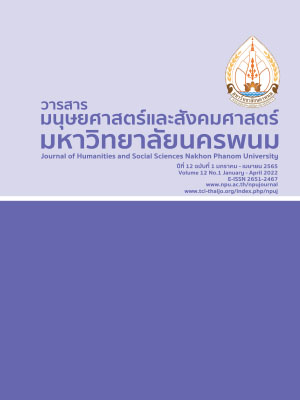Research and development of teacher professional competency, network schools co- development in the Special EconomicZone (SEZ) due to the royal initiative of Her Royal Highness Princess Maha Chakri Sirindhorn: A case study of Border Patrol Police School, Sa Kaeo Province, Thailand
Main Article Content
Abstract
This research aimed to develop a training course in order to strengthen the teacher professional competency at the Border Patrol Police School, Sa Kaeo Province. Secondly, the research intended to find the effectiveness of training courses for professional competency at the Border Patrol Police School. The research method had four phases: The first phasewas focusing on studying and analyzing the fundamental data; the second phase was the process of design and development; the third phase was: experimental fieldwork and the fourth phase was studying durability . The research population came from 11 teachers at the Border Patrol Police School, Sakaeo Province, a total of 250 people, sampling group were recruited from 30 teachers. The research instruments were 1) a knowledge measurement form 2) a skill assessment form 3) attitude measurement form. The statistics using for data analysis were including percentage, mean, standard deviation and statistical tests. The research results were found that 1) receiving a training course for enhancing teacher professional competency professional teacher at the Border Patrol Police School in Sa Kaeo Province, totaling 4 units. 2) The results of finding the overall effectiveness of the training course were considerably assumed as ‘very good,’ due toa total score of 510 points [84.99 percent] from results of comparing the knowledge average score and practical skills. In the attitude, the result suggested that the training scores the teachers achieved were different as comparing ‘pre’ and ‘post’ training. Teachers, who attended the training course had a performance’s score higher than the untrained stage as showing upon the statistical level at .01 and the knowledge retention results showed that 4 weeks after the completion of the training, the teachers who received the training was significantly higher than the untrained stage at .01.
Article Details

This work is licensed under a Creative Commons Attribution-NonCommercial-NoDerivatives 4.0 International License.
References
Cavalier, Don R. & others. (2005). “Employer Surveys of Core Competencies and Employer Focus Groups Responses.” The University of Minnesota Crookston Baccalaureate Level Graduates.
Laungnil, K. (2017). Guidelines for developing competencies of new teachers under the Office of Secondary Educational Service Areas, Area 2, according to the concept of teacher development by schools as base. Bangkok: Chulalongkorn University. [in Thai]
Ministry of Education. (2016). 2009 Second decade of educational reform. Bangkok: Assembly
Printing House, Agricultural Cooperative of Thailand Limited. [in Thai]
Nambamrung, P. (2017). The Development of Competency Training Curriculum for Head of Learning Groups in Secondary Schools under the Office of Secondary Educational Service Areas, Area 20. Praewa Kalasin. Journal Kalasin University. 4(3), 454-472. [in Thai]
Oliva, P. F. (1992). Developing the curriculum (3rded.). New York : Harper Collins.
Ozçelik, G. & Ferman, M. (2006). Competency Approach to Human Resources Management: Outcomes and Contributions in Turkish Cultural Context. Human Resource Development Review; 5(1).
Permanent Secretary for Education Office. (2017). The Educational Development Plan of the Ministry of Education, 12thed (2017-2021). Bangkok: The Teachers Council of Thailand. [in Thai]
Phrompitak, S. (2016). Conditions and Needs in Developing Online Training Courses. To increase teacher competency in the evaluation and evaluation of learning of learners. Journal of Education Faculty of Education Srinakharinwirot University. 17(1), 79-87.
[in Thai]
Saeedee, A. (2018). Development of training courses to enhance the capacity of teachers in the 21st Century by applying learning facilitation and empowerment teaching. Bangkok: Chulalongkorn University. [in Thai]
Sitthi, W. (2017). The development of participatory training courses for enhancing competency in learning management according to constructivist concepts. For teachers under the Office of Nakhon Phenom Educational Service Area, Area 2. Journal of MCU Social Sciences Periscope. 6(4), 168-179. [in Thai]
Suwanchatri, S. (2017). Development of Training Programs Emphasizing Competencies for Enhancing Competency and Sensitivity of Teachers. Al-Hikkahu Journal, Fatani University. 7(14), 9-22. [in Thai]
Wannasilp, K. (2019). The development of teacher training curriculum with an integrated
model on classroom research. Journal of Education Mahasarakham University. 13 (3), 25-40. [in Thai]
Write, T. (2001). “HR Competencies : Getting Them Right.” Canada HR Reporter. Toronto : November 5: 20.


